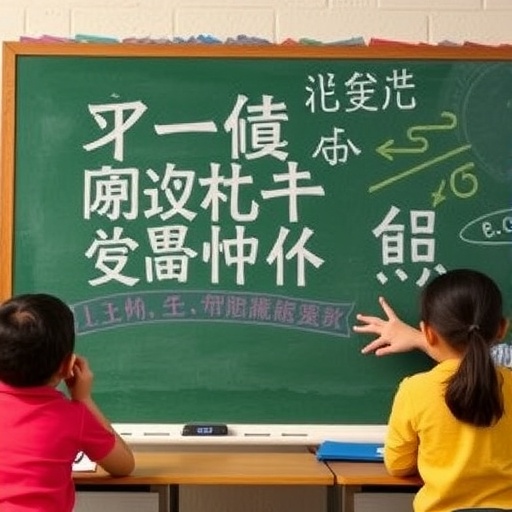A recent study published in the “Early Childhood Education Journal” sheds light on the evaluation beliefs held by preschool teachers in China. This research endeavors to expand our comprehension of how teacher characteristics and knowledge of teacher-child interactions influence their evaluation practices. In an era where early childhood education is increasingly vital for shaping future generations, understanding the belief systems of educators becomes essential. The study, led by researchers Chen, Zhou, and Hu, revolves around identifying specific profiles relating to teachers’ evaluative beliefs and the myriad factors that affect these perceptions.
The research meticulously examines the interrelations between teachers’ individual characteristics—such as age, experience, and educational background—and their evaluation beliefs. These characteristics play a crucial role in shaping how educators perceive and implement assessment strategies in the classroom. As the educational landscape evolves, it becomes imperative for scholars and practitioners alike to understand these dynamics better. The researchers utilized comprehensive surveys that garnered responses from a wide array of preschool educators, ensuring a representative sample that accurately reflects the current environment of early childhood education in China.
Through rigorous statistical analyses, the authors successfully categorized the teachers into distinct profiles characterized by differing evaluation beliefs. This segmentation provides valuable insights into how teachers in various circumstances develop their beliefs about student assessment. For instance, some teachers might prioritize formative assessments that focus on ongoing developmental processes, whereas others may lean towards summative evaluations that assess student skills at the conclusion of a learning period. Unraveling these preferences allows for a deeper understanding of educational practices and can inform training and policy decisions moving forward.
Moreover, the study highlights the role of teacher knowledge regarding effective teacher-child interactions. This aspect is particularly vital for early childhood educators, as the quality of these interactions impacts not only student learning but also emotional development. Teachers possessing stronger backgrounds in developmental psychology and pedagogy exhibit greater efficacy in fostering positive interactions with their students. When teachers are well-versed in recognizing the nuances of child behavior and learning styles, they are better equipped to assess their students effectively.
Understanding these evaluation beliefs goes beyond mere academic interest; it has practical implications for improving educational outcomes in preschool settings. By identifying the factors that contribute to teachers’ evaluation beliefs, the study provides a roadmap for enhancing teacher training programs. Initiatives aimed at augmenting teachers’ knowledge of child development and pedagogy could potentially lead to more effective assessment practices in classrooms across China.
Additionally, the researchers emphasize the need for ongoing professional development tailored specifically to the needs of preschool educators. Continuous learning opportunities can help teachers stay abreast of the latest research and best practices in early childhood education. This commitment to professional growth not only benefits educators but also enriches the learning experiences of young children, aligning perfectly with contemporary educational goals.
Importantly, the findings suggest that the culture surrounding educational assessments greatly influences teachers’ beliefs. In a context where standardized testing and performance metrics are prevalent, teachers may feel pressured to conform to specific evaluation styles. The balance between maintaining educational integrity and adapting to external expectations poses an ongoing challenge for preschool educators. The study’s insights into this dynamic encourage a dialogue around how to cultivate a more supportive environment that prioritizes child-centered assessment practices.
Furthermore, the researchers advocate for a more reflective approach to teacher evaluations. Encouraging educators to contemplate their own beliefs and practices can lead to greater self-awareness and improved assessment methods. By fostering a culture of reflection and critical thinking, schools can empower teachers to take ownership of their evaluative processes, ultimately benefiting the students they serve.
The implications of this research are broad-reaching, extending beyond individual classrooms to influence larger educational policy. Policymakers ought to consider the findings when developing standards and regulations that govern early childhood education. By aligning assessment practices with teachers’ beliefs and strengths, educational systems can create a more cohesive and effective approach to learning.
In conclusion, the study conducted by Chen, Zhou, and Hu illuminates crucial aspects of early childhood education in China. By exploring the interplay between teacher characteristics, evaluation beliefs, and knowledge of child interactions, the research underscores the complexities inherent in preschool assessments. As stakeholders in education continue to navigate the evolving landscape, prioritizing the insights from this study could pave the way for enriching the experiences of educators and students alike.
By engaging with these findings, educational institutions can take tangible steps toward fostering a more effective early childhood education framework. This research not only challenges current notions of assessment in preschool settings but also inspires future inquiries and discussions that aim to enhance educational practices globally.
Ultimately, it is clear that the beliefs held by preschool teachers regarding evaluation are not merely academic abstractions; they significantly impact teaching strategies, student engagement, and learning outcomes. Through a deeper understanding of these beliefs, educators can work towards creating more effective, nurturing environments for the youngest learners. Any improvement in assessment practices will resonate positively through schools and into the homes and communities of students, leading to a brighter future for all.
Subject of Research: Evaluation beliefs of preschool teachers in China and their associations with teacher characteristics and knowledge of teacher-child interactions.
Article Title: Profiles of Chinese Preschool Teachers’ Evaluation Beliefs: Associations with Teacher Characteristics and Knowledge of Teacher-Child Interactions.
Article References:
Chen, Y., Zhou, Y., Hu, B.Y. et al. Profiles of Chinese Preschool Teachers’ Evaluation Beliefs: Associations with Teacher Characteristics and Knowledge of Teacher-Child Interactions.
Early Childhood Educ J (2025). https://doi.org/10.1007/s10643-025-02032-4
Image Credits: AI Generated
DOI: 10.1007/s10643-025-02032-4
Keywords: preschool education, evaluation beliefs, teacher characteristics, teacher-child interactions, professional development, formative assessments, summative evaluations, educational policy.




